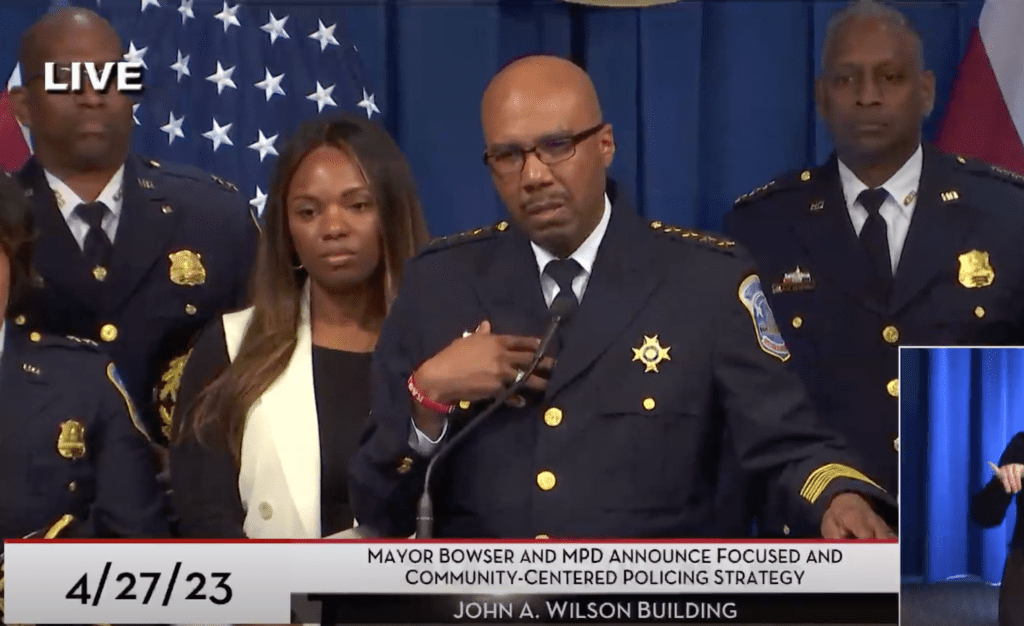D.C. Police Chief Contee Retires to Join FBI
By • April 27, 2023 0 1838

The retirement announcement and presser for the Chief of D.C.’s Metropolitan Police Department, Robert J. Contee III – who had been on the force over 30 years, ever since he was a 17-year old “D.C. kid” who enthusiastically signed up to be a police cadet –was a full-on respect-fest on Thursday, April 27 at the mayor’s Wilson Center press room filled with reporters who asked civil questions (and one protester with a sign).
The morning conference followed Mayor Bowser’s surprise announcement Wednesday evening that the well-regarded Chief Contee — whose basic focus to policing is “community engagement” – had accepted a position in the Directorship of the Federal Bureau of Investigation (FBI) and would be leaving June 3. There will be a nation-wide search for a successor. But the mayor – who also described herself as a ‘D.C. Girl” – emphasized recruitment would be looking inward as well as outward – testing and perhaps proving Chief Contee’s well-known motto: “Excellence is transferrable.”
Bowser thanked Chief Contee effusively for leading MPD with passion and purpose. “He has pushed our criminal justice system to do more and be better. He has led MPD through an incredibly challenging time for our country – from the pandemic to January 6th and navigating the effects of a shrinking department during a time when gun violence is exploding across the nation,” Bowser wrote in a statement. “He has been a phenomenal ambassador of what it means to be a police officer in D.C. – brilliant, compassionate, and determined to build a D.C. where all people feel safe and are safe.”
Contee also spoke passionately about his career, how it evolved and how the force has seen a decrease in most violent crime even while working with an over-extended officer corps with the lowest number of police on patrol in recent history. He came to rely on data and evaluations of policing best practices across the country to target “hot crime spots,” he said. The goal is officer engagement – where MPD officers of all ranks get out of their patrol cars and engage, relate to the community. “A new patrol of community police on mountain bikes is being trained and [they] are urged to become problem solvers – partnering with other community agencies and not just standing on certain street corners waiting for a crime to happen and to arrest someone,” Contee recounted.
The goal is to have engaged police who are known to the community while the community knows them. “It requires constantly evaluating the crime data and being flexible,” Contee said. “But, it has been shown that engaged police communities have less crime.”
The Chief also passionately expressed his belief that his career of moving up through the ranks from cadet, to police officer, lieutenant, and finally as the Chief of Police serves as an example to all on the force that they can develop a career within the department or in other agencies as they improve their abilities and advance on their experiences of success. Almost with awe, he spoke about how he is now moving to a new career as Assistant Director for the FBI’s Office of Partner Engagement, where he can use his skills and knowledge on a national level while still be able to serve his hometown.
Both the Chief and the Mayor frequently point to the courts and a policing policy environment too lenient on offenders and a difficulty for the MPD’s shrinking force. “Due to a negative policy environment for law enforcement and the lack of interest of younger generations in long-term government careers (a three-year max seems to be the younger generation’s career span, Contee said at the press conference), MPD staffing may not recover for more than a decade.

